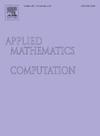Learning a robust shape parameter for RBF approximation
IF 3.4
2区 数学
Q1 MATHEMATICS, APPLIED
引用次数: 0
Abstract
Radial basis functions (RBFs) play an important role in function interpolation, in particular, when considering an arbitrary set of interpolation nodes. The accuracy of the interpolation depends on a parameter called the shape parameter. There are many approaches in the literature on how to appropriately choose it to increase the accuracy of interpolation while avoiding stability issues. However, finding the optimal shape parameter remains a challenge in general. We introduce a new method for determining the shape parameter in RBFs. First, we construct an optimization problem to obtain a shape parameter that leads to a bounded condition number for the interpolation matrix, then, we introduce a data-driven method that controls the condition number of the interpolation matrix to avoid numerically unstable interpolations, while keeping good accuracy. In addition, a fallback procedure is proposed to enforce a strict upper bound on the condition number, as well as a learning strategy to improve the performance of the data-driven method by learning from previously run simulations. Several numerical results are presented to demonstrate the robustness of our strategy in both 1- and 2-dimensional spaces.
学习一种鲁棒形状参数用于RBF逼近
径向基函数(rbf)在函数插值中起着重要的作用,特别是在考虑任意一组插值节点时。插补的精度取决于一个称为形状参数的参数。在文献中有许多关于如何适当地选择它以提高插值精度同时避免稳定性问题的方法。然而,寻找最优的形状参数仍然是一个挑战。介绍了一种确定rbf形状参数的新方法。首先,我们构造了一个优化问题,以获得导致插值矩阵条件数有界的形状参数,然后,我们引入了一种数据驱动的方法来控制插值矩阵的条件数,以避免数值不稳定的插值,同时保持良好的精度。此外,还提出了一种回退过程来强制条件数的严格上界,以及一种学习策略,通过从先前运行的模拟中学习来提高数据驱动方法的性能。几个数值结果证明了该策略在一维和二维空间中的鲁棒性。
本文章由计算机程序翻译,如有差异,请以英文原文为准。
求助全文
约1分钟内获得全文
求助全文
来源期刊
CiteScore
7.90
自引率
10.00%
发文量
755
审稿时长
36 days
期刊介绍:
Applied Mathematics and Computation addresses work at the interface between applied mathematics, numerical computation, and applications of systems – oriented ideas to the physical, biological, social, and behavioral sciences, and emphasizes papers of a computational nature focusing on new algorithms, their analysis and numerical results.
In addition to presenting research papers, Applied Mathematics and Computation publishes review articles and single–topics issues.

 求助内容:
求助内容: 应助结果提醒方式:
应助结果提醒方式:


